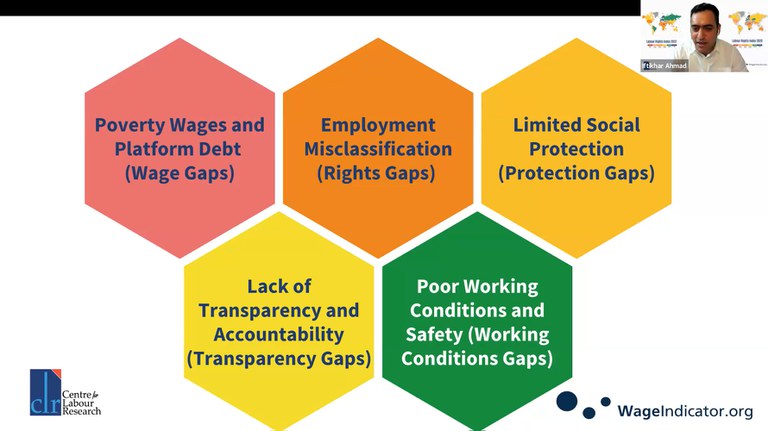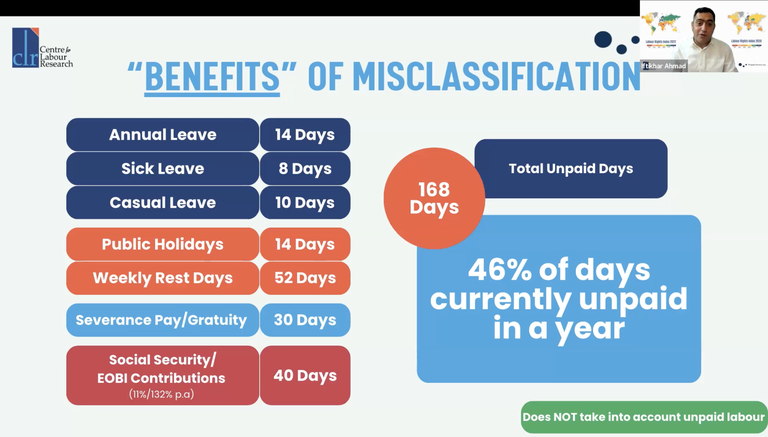Are there effective examples of gig workers being helped to regain negotiation power and build a collective voice?
Are workers doing something themselves?
Can these projects or initiatives have a real impact in terms of policy implications?
To answer these questions, after Uma Rani’s keynote speech, Valeria Pulignano, Professor of Sociology at the Centre for Sociological Research at KU Leuven, moderated the panel discussion. She gave the audience the opportunity to learn more about the research activities and the professional experience of three speakers:
- Mark Stuart, Pro Dean for Research and Innovation at Leeds University Business School and one of the principal investigators at the Leeds Index of Platform Labour Protest,
- Denise Kasparian, Assistant Professor at the University of Buenos Aires in Argentina and author of the book “Co-operative Struggles,” and
- Iftikhar Ahmad, comparative labour law expert and founder of the Centre for Labour Research in Pakistan.
The key issue is pay
Some key points emerged during the discussion, starting with the main reason why workers are at the forefront when it comes to making their voices heard, which is pay, and how they try to impact the platforms’ decisions on this, which is by protesting.
This highlight comes from the research of a team at the University of Leeds in the United Kingdom, represented at the webinar by Mark Stuart. This group of researchers has been looking at labour protests globally and documenting movements and actions, documenting these in a database, labeled the Leeds Index of Platform Labour Protest.
The results are quite interesting and show a correlation between the reasons driving these actions and who these workers are represented by: “The key issue is pay,” Mark Stuart said, especially when protests are driven by former workers or self-mobilised groups, which is the main case. “The key issue tends to be around employment when we see more involvement by established unions. Grassroots unions tend to be focused on supporting workers around issues of pay, and workers collectives tend to be involved in building collective actions around pay and deactivation issues.”
Can these protests have a follow-up? “Protests are often very short term and involve few workers. We are starting to see that one protest in one city is replicated in other cities.” However, the Leeds team doesn’t recognize true levels of coordination, and this lack represents an obstacle to turning the protests into policy initiatives.
The hope is that different workers’ voices start to be embedded in more collective frameworks to be heard as they deserve: “There is a lot of movement, and governments and regional blocks have started looking more carefully at issues around regulation in the platform economy.”
Cooperatives: global competition and local differences
Speaking of alternative platform economy models, one could not fail to mention cooperatives. “Cooperatives are organisations that seek to meet common needs based on voluntary and open membership, democratic economic participation, and concern for community,” Denise Kasparian explained in her speech. “The main contribution to the platform economy is that they generally provide decent jobs and work opportunities in more democratic and fair environments.” And she added: “They are an effective tool for workers to organise for social empowerment in general.”
As for the possible outcomes of cooperatives to a fairer level playing field for gig workers, Denise Kasparian emphasised that this business model is not exempt from weaknesses related to the individualistic nature of the cooperatives themselves: “Nowadays, what makes platforms so powerful is their global scale. If we want to build a collective voice, the global cooperative movement is the critical player because it has human, economic, institutional, and political resources to build that voice.”
It also means that in order to create a level playing field for gig workers, isolated cooperatives are not the right solution, especially if we consider all the barriers that prevent workers from participating, which are mainly economic and cultural. “Economy often fosters individuality and isolation. We are not used to participating.”
Despite studying the topic for years, Denise Kasparian recognized that “cooperatives are not the only solution, but one of the solutions. They build worker power, but whether they can work everywhere still remains an open question. Actually, no model works the same everywhere.”
In this regard, she gave the example of CoopCycle, which originated in France and then exported through local coops.
“CoopCycle soon understood that the words cooperative or sustainability do not mean the same thing in all parts of the world. To be able to function in Latin America, for example, they had to debate if motorbikes could be used instead of bikes, and that was a very sensitive debate in the organisation.”
This implies being aware that processes do not follow a one-way direction from a centre: “When we think about geographic scaling of cooperatives, we need to think of processes of adapting, and not replicating. Local identities have to be assessed when we think about the feasibility of the platform coops. We don’t have to forget that technologies are digital but also social entities.”
THE ROLE OF REGULATION
At this point, Valeria Pulignano asked Iftikhar Ahmad what the role of regulation is when a level playing field for gig workers needs to be created.
He painted a clear picture: “When you look at the platform workers globally, you find many gaps related to labour rights, transparency, and working conditions. These gaps exist because states have been reluctant to regulate this sector.”
When workers struggle with low pay, lack of unemployment benefits, lack of transparency, and unfair deactivation, it means that “governments have adopted deregulation, companies can leave at any moment, and jobs are lost.”

Consulting the Labour Rights Index, a tool developed by WageIndicator and Centre for Labour Research to measure major aspects of employment regulation, makes it clear that a lack of regulation, or the absence of it, poses several challenges to workers’ rights and conditions: “Here in Pakistan, we experience the cost of working with the platform exceeding the earnings.” Negative incomes are quite common for 7 million location-based platform workers in the country and severely impact not only the workers themselves but also the state: “The state is losing billions of social contributions thanks to platform workers’ misclassification as independent contractors.”
The main criticism of gig workers’ employment status is that it raises costs: “Of course, the costs rise, but it’s the job of the state to ensure that workers are not exploited. As we have just seen, it’s not only the workers, it’s also the state that is losing.”
Speaking of solutions, the Centre for Labour Research has presented the Islamabad Capital Territory Platform Workers Protection Bill, a draft regulation aiming to correctly determine the
employment status of platform workers, give them access to fundamental rights and provide more transparency with regard to algorithmic management on digital labour platforms.
“We created employment indicators and tried to see whether the platforms in the country meet the employment classification criteria. They meet 4 of the 5 criteria. These platforms’ workers are not being given their rights.”
These rights include access to minimum wage, working hour restrictions, base payments on public holidays or night shifts, fair and accessible contracts (“Not thousand-page contracts where a person can't understand what is happening”), protection against discrimination and harassment, and collective bargaining.
“If it is difficult for the states to give a whole slew of rights to the platform workers, it can be done in a phased manner to at least ensure that workers should have access to the universal liberal guarantees, without any regard to their contract status.”

The WageIndicator Gig Team has scheduled its next webinar on March 22, 2024. ‘Unpaid Labour in the Gig Economy’ will focus on the sensitive topic of unpaid labour in the platform work: how can it be defined? Does it mean the same thing for different categories of gig workers? Can it be quantified and mitigated?
